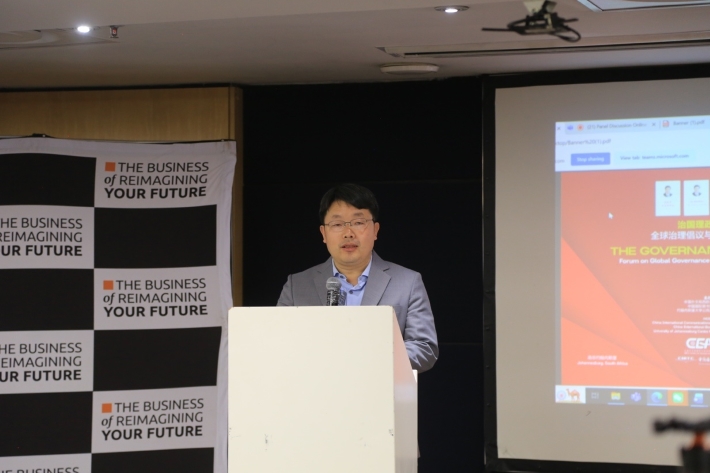Inspiring the Global South


China is playing an increasingly active and important role in global politics and economy, especially in the development of the Global South. One of its most recent initiatives, the Global Governance Initiative, in a sense represents the aspiration of the Global South, said Busani Ngcaweni, director of the University of Johannesburg Centre for Public Policy and African Studies. “I call it the Global South consensus,” he noted.
Ngcaweni made the remarks at a panel discussion on Volume V of Xi Jinping: The Governance of China, held at the University of Johannesburg Centre for Public Policy and African Studies on 30 October. Over 60 participants, including Ngcaweni, Philasande Sokhela, senior manager of the Centre for African Business of Johannesburg Business School, and Sam Masango, deputy speaker of Mpumalanga Provincial Legislature, attended the forum, which was themed “The Governance of China: Forum on the Global Governance Initiative and Youth Leaders.”

Coherent thinking
Sokhela said he was quite intrigued by some of the insights contained in the book, particularly about coherent thinking, turning power into purpose, and governance into a driver of human progress. When good governance drives public policy, it becomes an agent of transformation, enabling job creation, entrepreneurship, inclusive growth, as well as improvements in people’s living conditions, which is important in the African and Global South context.
“What is required is a governance model that is context-sensitive, inclusive of local realities, as well as coherent across institutional and policy areas. In terms of the book, it outlines the vision of governance where coherent thinking, institutions, and values are entrenched,” he said. China follows people-centric governance; governance is not about wielding power, but about serving the people's aspirations for a better life. Power should have purpose, and governance systems must align with institutional authority, policy intent, legislative frameworks and values. Without this alignment, power remains unchanneled, he added.

While introducing the newly published book, Ni Yanshuo, chief reporter of ChinAfrica magazine, said the fifth volume builds on earlier editions by making President Xi’s ideas accessible to a wider global audience. It outlines the principles and practices of governance in China at a time when the country is assuming greater responsibility in shaping an international order that is inclusive and responsive to both traditional and emerging global challenges.
“Strengthening unity and solidarity with Global South countries, especially African countries, for common prosperity is an important part of China’s international cooperation strategy,” he said. At the 2024 Beijing Summit of the Forum on China-Africa Cooperation, President Xi stated, “China and Africa account for one-third of the world population. Without our modernisation, there will be no global modernisation.” The statement speaks powerfully to the vision of a community with a shared future for humanity and the practical tools needed to build it.
He noted that Volume V of Xi Jinping: The Governance of China arrives at the right time, as deficits in governance and their impact on the delivery of public goods have become major problems in many countries. The experiences and insights from China’s contemporary governance presented in the book can provide practical guidance for such discussions worldwide.

People-centred governance model
In his presentation, Masango focused on China's industrial development as depicted in the book. The main framework of China's approach centres on key policy areas, including the modernisation of the industrial system. This involves reinforcing the real economy and promoting an integrated, innovation-driven industrial advantage, both of which are highlighted in the book. “China is growing stronger, and what China is emphasising is openness, which aligns with its own best interests for development. Developing countries are beginning to open their doors, focusing on skills, infrastructure, production, and trade,” he shared with the press.
China is more industrialised than ever. That is a result of good industrial policies. The policies aim to boost the economy, balance consumption and investment, and focus on supply-side reforms, he said.
The book also underscores China’s commitment to green development, particularly through its energy transition initiatives. China has adopted a range of strategies to advance sustainable energy, offering valuable insights into effective regional coordination. This approach not only promotes balanced development across different areas, but also emphasises revitalisation as a core objective.
“I think what's quite important about the book is also the context, the historical context, in which all of these ideas on people-centred governance come from … the historical development of China's economic policies,” said Bantu Siwisa, senior lecturer in the Department of Politics and International Relations at the University of Johannesburg. He said South Africa should learn from it, particularly the people-centred governance. “So, I think for me, one of the key takeaways in this book is the whole approach of not just being people-centred, but a vision, a long-term plan,” he said.

An international leader
Elizabeth Shawa, lecturer at the Johannesburg Business School, noted that the success of China’s development lies in its long-term plans that are well implemented, like its five-year plans on development. China is about to issue its 15th Five-Year Plan, which will cover 2026-2030.
"I think, when compared to South Africa or other Southern African countries, the key challenge we face is not the absence of long-term plans, but rather the lack of institutionalised structures for implementation. Without these structures, implementation becomes difficult, especially with the changing electoral cycles," she said. "The crucial point is that, regardless of which government is in power, the work should continue, whether at the national level or across Africa as a whole."
During the discussion, Bongani Mayimele, director of International Relations and Partnerships at the National School of Government, emphasised that the foundation of China’s governance is central to its success. “Unlike many Western countries, where legitimacy is often rooted in military power, China’s governance is built on what we call the happiness of its people,” he explained. “This approach has fostered a sense of comfort and stability among the Chinese population.”
He pointed out that some of the key lessons Africa can learn from China go beyond traditional production factors. Specifically, China’s approach to reform and opening up, along with its state capability, strategic foresight, and long-term vision, has been transformative. These elements have played a critical role in elevating China from a poor country to the global power it is today.
"South Africa's anchor lies in its constitution. We must unite South Africans and work towards building a prosperous nation," he emphasised. "We can also achieve what China has by following a similar trajectory - emerging from five-year plans, embracing emerging industries like e-commerce, and transitioning towards stronger manufacturing capabilities."
In his concluding speech, Ngcaweni emphasised the continuity and progression through the five volumes of the book. “If you read the fifth volume, you should not be surprised by recent announcements, such as the Global Governance Initiative,” he said.
Today, China is more focused on long-term thinking than ever before. It is no longer focused solely on resolving domestic issues but is actively addressing international challenges. For example, when the Trump administration imposed sanctions, including on smaller nations like Lesotho, China responded by offering zero-tariff treatment to 100 percent of tariff lines for all 53 African countries with diplomatic ties to China. “Now he’s a national leader. He’s actually an international leader,” Ngcaweni remarked.
The Volume V of Xi Jinping: The Governance of China was first published in July of this year. This volume compiles 91 of Xi Jinping’s spoken and written works from 27 May 2022 to 20 December 2024, including some pieces published for the first time.


